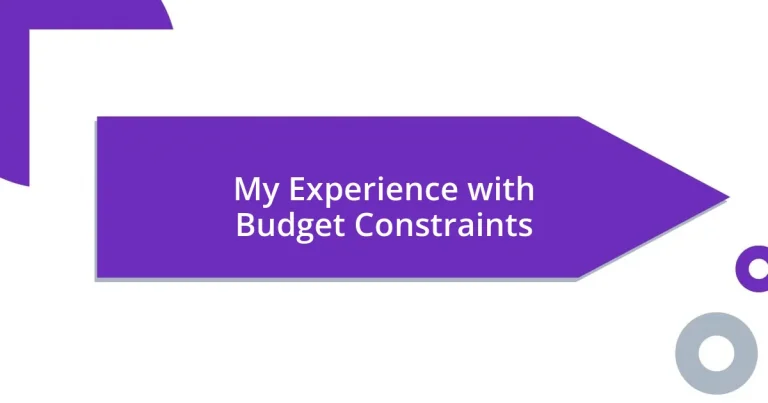Key takeaways:
- Recognizing and embracing budget constraints can foster creativity and meaningful experiences over material excess.
- Implementing budgeting strategies such as the 50/30/20 rule and zero-based budgeting enhances financial control and accountability.
- Learning to say no to unnecessary expenses empowers individuals to prioritize spending that aligns with personal goals.
- Adapting to unexpected expenses involves flexibility and reassessing priorities, which can turn challenges into opportunities for growth.
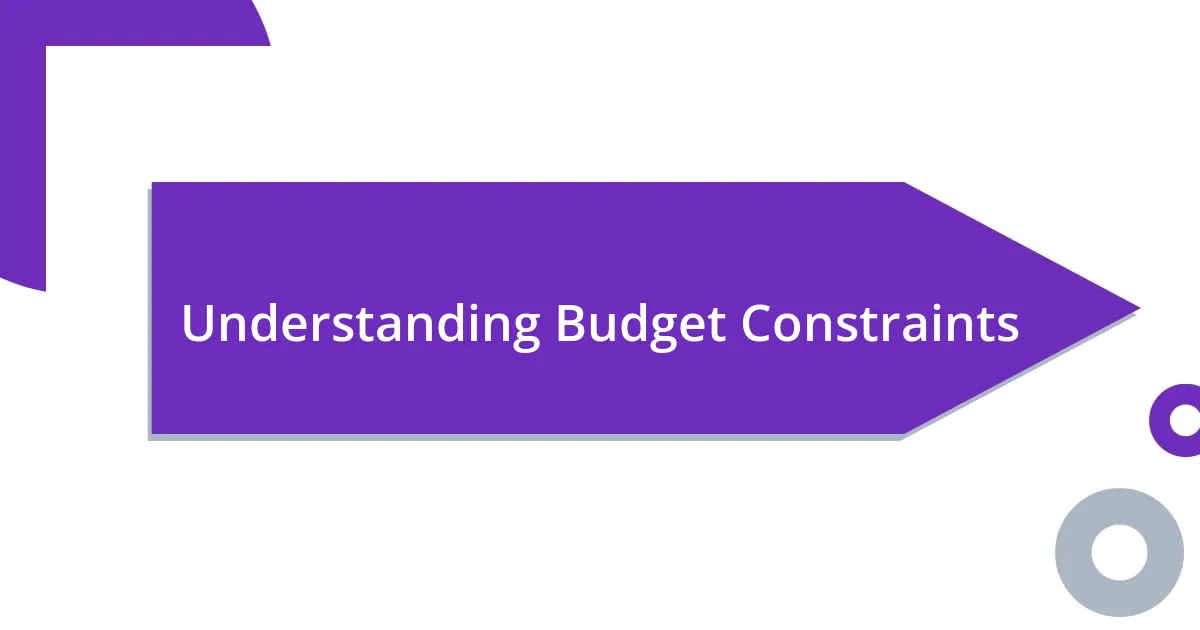
Understanding Budget Constraints
Understanding budget constraints involves recognizing the limitations that we face when managing our finances. I remember the first time I had to stick to a strict budget. It wasn’t just a number on paper; it felt like my freedom was restricted. Have you ever felt that pinch? That realization can be both daunting and eye-opening.
When I started budgeting for a significant life event, I quickly learned that my aspirations often exceeded my financial reality. It forced me to make tough decisions—sacrificing a fancy venue for something more intimate. But you know what? I discovered the beauty in simplicity, realizing that the memories created were far more valuable than an extravagant setting.
Budget constraints can also spark creativity. Recently, a friend of mine transformed her kitchen with just a few DIY touches instead of a complete renovation. And that got me thinking—how often do we let financial limits inspire us rather than discourage us? Embracing constraints can lead to unexpected solutions, making our efforts even more meaningful.
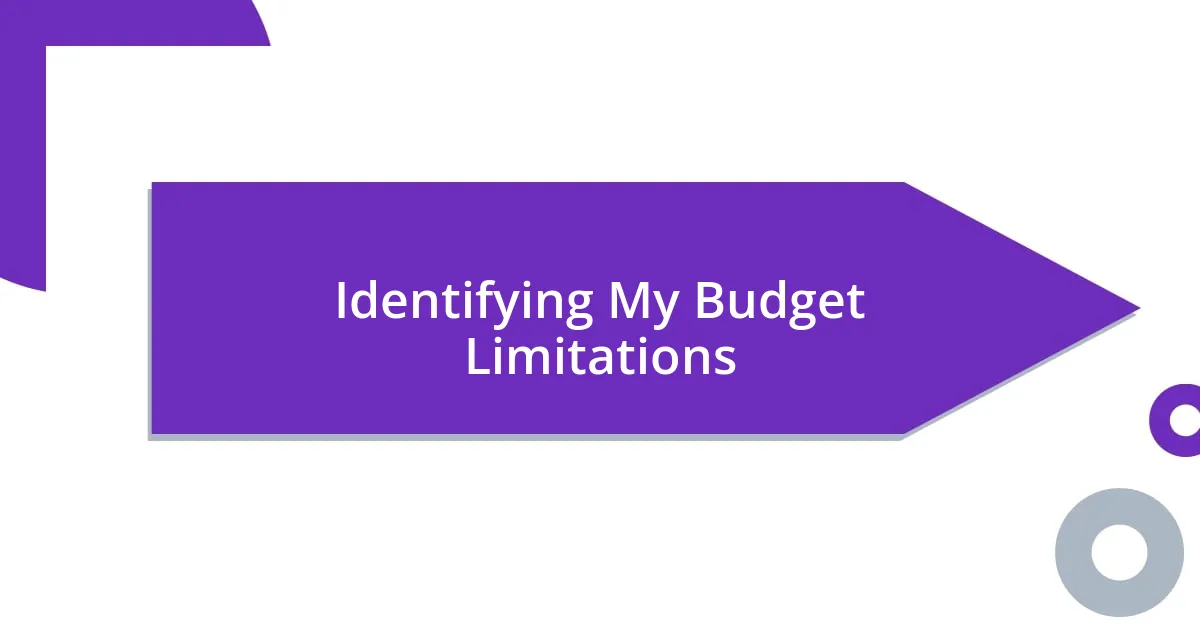
Identifying My Budget Limitations
Identifying budget limitations is a journey that can reveal unexpected truths about our spending habits. I recall when I decided to track every expense, hoping to uncover hidden costs. It was eye-opening to see how much I spent on small, impulsive purchases, like that third coffee of the week. Each tiny expense added up, and it hit me just how easily our budgets can be stretched beyond their limits without us realizing it.
To effectively identify my budget limitations, I found it helpful to consider the following:
- Review Monthly Expenses: I catalogued all my fixed and variable expenses to see where my money was going.
- Set Spending Goals: This made it easier to distinguish between needs and wants.
- Prioritize: Focus on essential expenses first, which helped me allocate resources more mindfully.
- Reflect on Values: I asked myself what truly mattered—was I aligning my spending with my priorities?
- Seek Feedback: Sometimes discussing my budget with friends led to fresh perspectives and invaluable advice.
By actively engaging in this process, I began to see my financial landscape more clearly, allowing me to make informed decisions about my money.
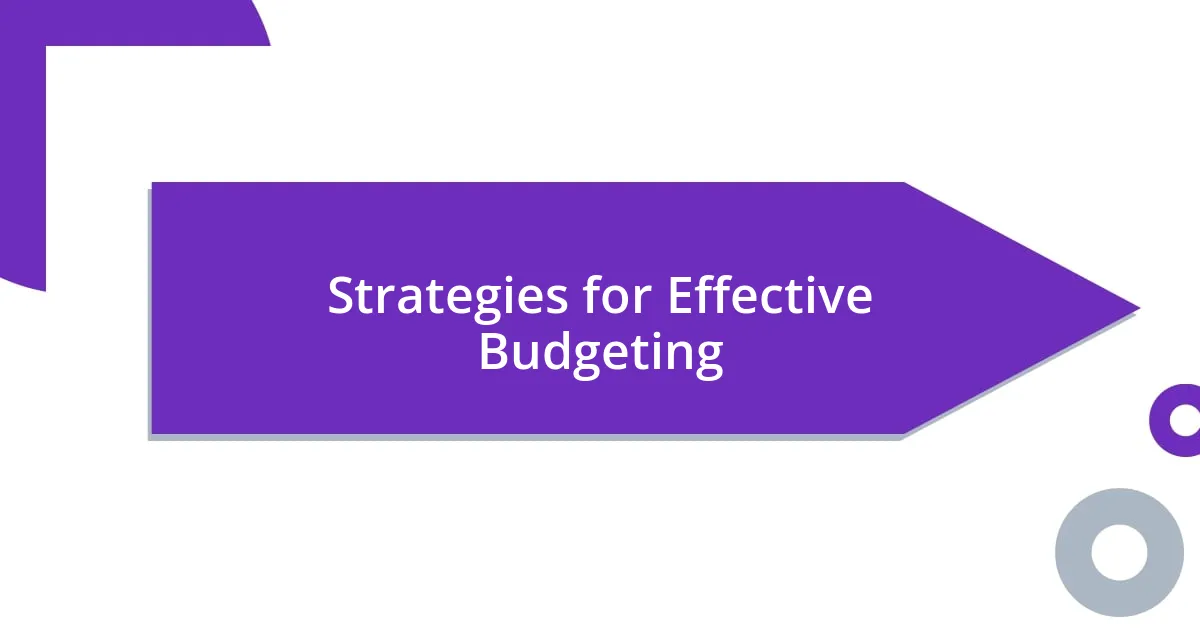
Strategies for Effective Budgeting
I believe that effective budgeting comes down to a few pivotal strategies that can truly change our financial landscape. One significant approach I’ve embraced is the 50/30/20 rule. This means allocating 50% of income to needs, 30% to wants, and 20% to savings or debt repayment. When I first applied it, it transformed the way I prioritized spending. Seeing those percentages laid out felt empowering, almost like a roadmap guiding me through the complex terrain of my finances.
Another strategy that has worked wonders for me is creating a zero-based budget. This technique involves assigning every dollar a specific job until there are no leftover funds. When I first tried this, I was surprised at how fulfilling it felt to give each dollar purpose. It removed the guesswork from my finances and made me feel in control. Plus, I found it helpful to use budgeting apps to track all my expenses, which streamlined the process and kept me accountable.
Lastly, I can’t stress the importance of regularly reviewing and adjusting your budget. Life is dynamic, and so are our financial needs. For instance, when my work situation changed, revisiting my budget allowed me to adapt quickly and maintain financial stability. I suggest setting aside time each month to reflect on your budgeting practices and consider any adjustments you need to make to keep your goals on track.
| Strategies | Description |
|---|---|
| 50/30/20 Rule | Allocates 50% to needs, 30% to wants, and 20% to savings or debt repayment. |
| Zero-Based Budget | Assigns every dollar a specific job until no funds are left over, creating accountability. |
| Regular Review | Involves monthly reflection and adjustments to adapt to changes in financial needs. |
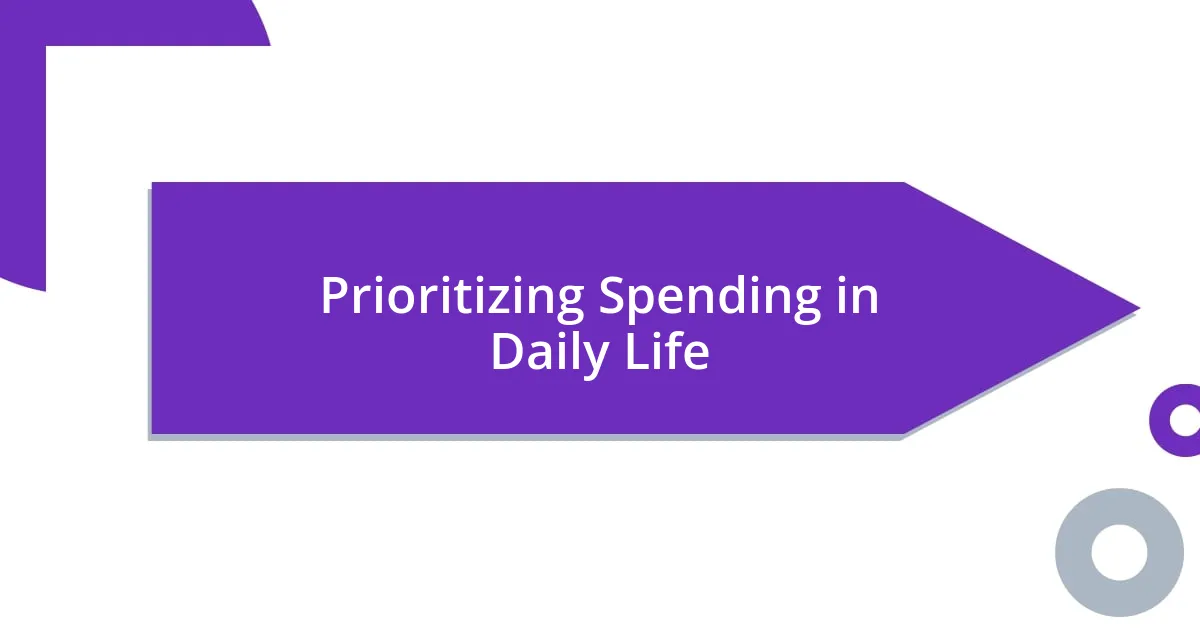
Prioritizing Spending in Daily Life
It’s fascinating how prioritizing spending can reshape our daily lives. I remember when I decided to cut out unnecessary subscriptions. The first month felt strange; I had grown so accustomed to mindlessly renewing them. But after a couple of weeks without Netflix, I discovered I was reading more books and even picking up painting again. It made me think: what else could I be doing with that time and money?
Now, I always ask myself about the significance of each expense. Do I really need that fancy lunch out, or would I enjoy cooking a meal at home more? This little question has led to some delightful evenings experimenting in the kitchen, and not to mention, notable savings. Sometimes, it feels more rewarding to invest in experiences or skills rather than just food or material goods.
Making conscious spending choices gives me a sense of control I didn’t know I was missing. I started budgeting by visually assigning different jars for various needs—essential bills, fun activities, and savings. Watching those jars fill up is quite satisfying! It reinforces a thought: our choices determine our financial destiny. Each small decision can align with my long-term aspirations, proving that prioritizing spending is more than just numbers; it’s about creating a life that reflects my values.
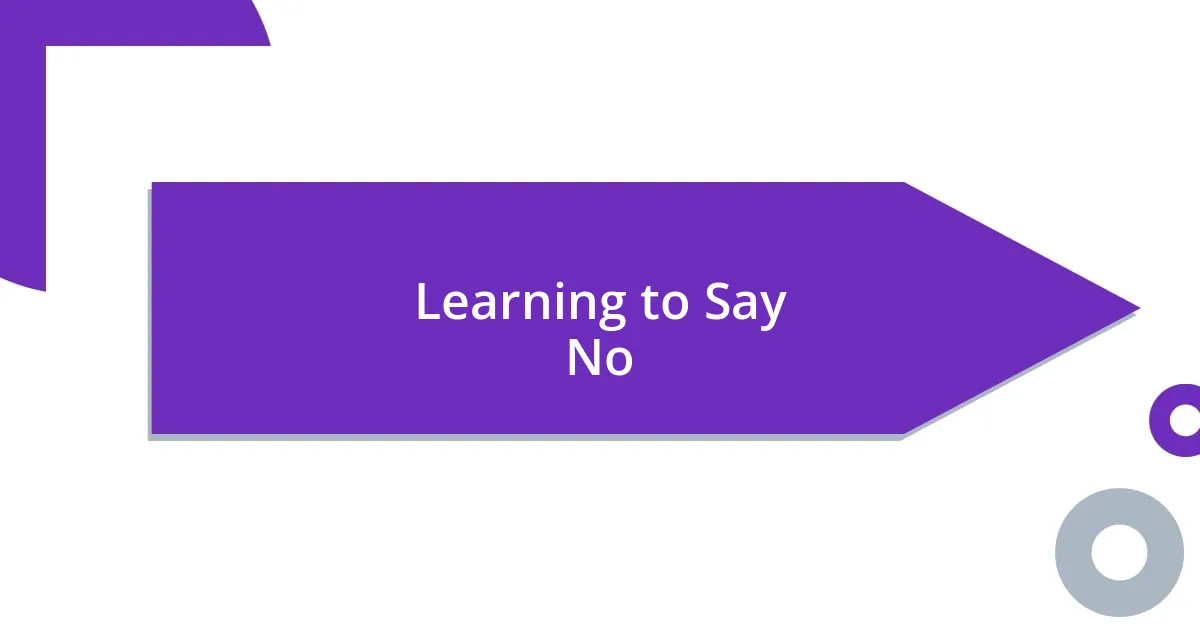
Learning to Say No
Learning to say no can be one of the hardest lessons to embrace, especially when it comes to budget constraints. I remember the first few times I turned down social invitations simply because they didn’t align with my financial goals. It felt uncomfortable at first—what if my friends thought I was being too frugal? But as I began to prioritize my budget, I realized that saying no was actually empowering. It gave me the freedom to say yes to the things that truly mattered to me, like investing in a weekend getaway that revitalized my spirit.
Recognizing my limits taught me the value of discernment. I once hesitated to decline an expensive concert ticket from a friend, feeling pressure to maintain social ties. However, after stepping back and considering my financial priorities, I decided to say no. Interestingly, I found an alternative plan that was equally enjoyable—hosting a game night at home! It felt incredible to create a fun experience without overspending, and it reinforced my belief that saying no doesn’t mean missing out; it can open doors to new adventures that align with my goals.
As I navigated these experiences, I discovered that learning to say no also required a mindset shift. Instead of viewing it as deprivation, I started seeing it as a way to enhance my life. It instilled in me a sense of financial discipline, making each decision more intentional. When I decline an impulse purchase, I often imagine what celebrating my next big financial goal will feel like—like finally taking that dream trip or building a healthy savings cushion. Those visions make saying no much easier and far more rewarding.
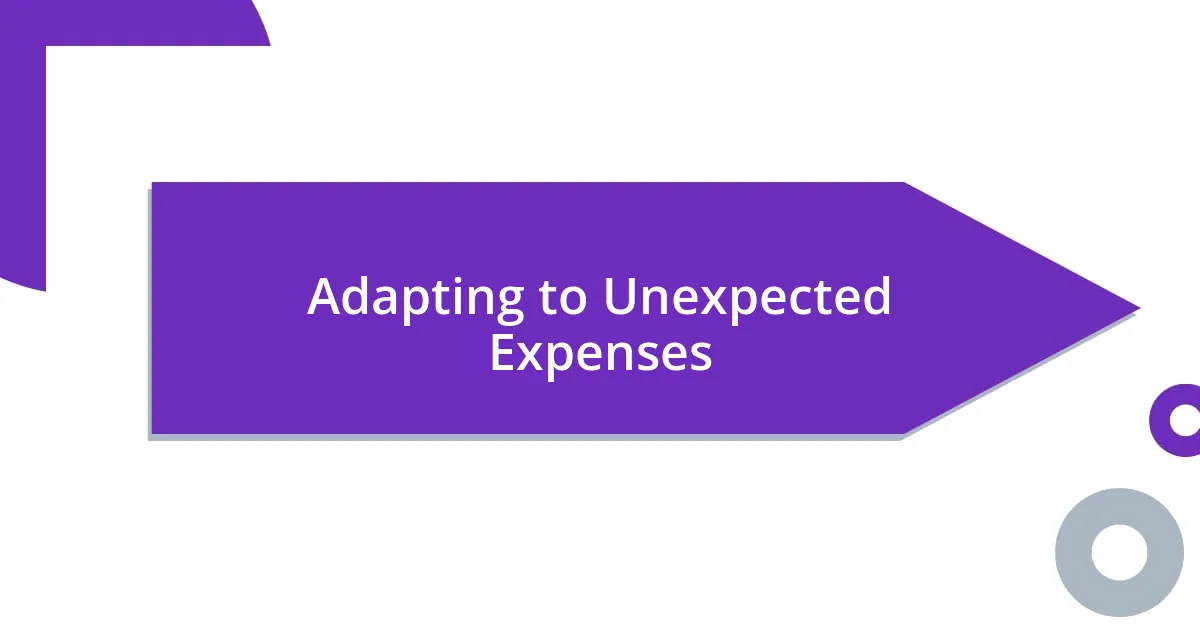
Adapting to Unexpected Expenses
Adapting to unexpected expenses can be a real test of our budgeting skills. I recall one unexpected month when my car needed urgent repairs. Initially, I felt overwhelmed, thinking about how this expense would throw off my plans. But I quickly realized that adaptability was key. I rearranged my budget by cutting back on dining out and skipped my regular coffee shop visits. This shift not only helped me manage the surprise expense but also made me more mindful of my overall spending habits.
There was a time when I faced an unexpected medical bill that nearly derailed my finances. Instead of panicking, I took a deep breath and created a short-term adjustment plan. I delved into my savings, largely untouched up until that moment. While it was tough to part with that money, I felt a strange sense of relief as I paid the bill—like I was taking back control of my life. Have you ever felt that rush of empowerment when you tackle a daunting challenge head-on?
What I’ve learned is that life is unpredictable, but our response doesn’t have to be. Embracing adaptability has become a powerful lesson for me; it’s about viewing unexpected expenses as a chance to recalibrate my priorities rather than a setback. I often ask myself, “How can I turn this situation into an opportunity for growth?” I’ve found that by staying flexible and creative with my budgeting strategies, I not only cope better but also feel more secure in my financial journey.
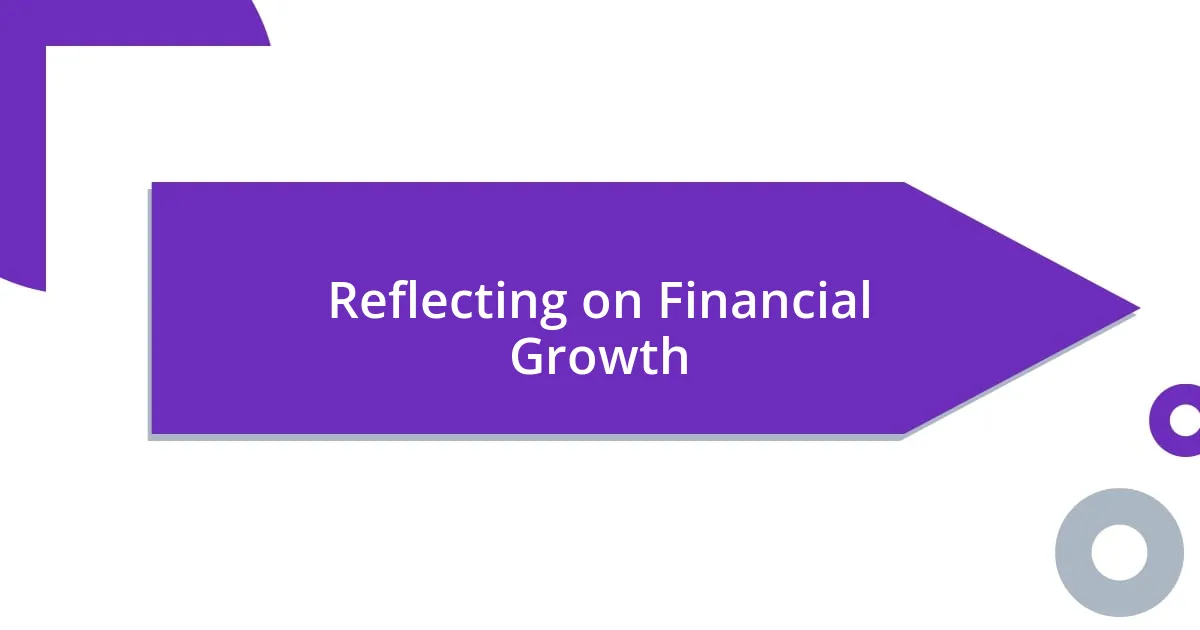
Reflecting on Financial Growth
Reflecting on my financial growth has been a transformative journey. I vividly remember the first time I reviewed my monthly expenses and felt a mix of embarrassment and clarity. How could I have spent so much on trivial things? This realization hit hard, but it sparked a commitment to track my spending diligently. The process of examining my finances made me recognize patterns that were holding me back, empowering me to redirect my money towards my goals instead.
A moment that stands out in my reflection is when I successfully reached a savings milestone. I had set a goal to save a specific amount for a personal project that truly mattered to me. The excitement I felt when I crossed that threshold was a rush I hadn’t anticipated. It became clear that my frugal decisions were not about deprivation; they were investments in my future. Can you relate to that feeling of triumph when hard work pays off? For me, it was like unlocking a new chapter in my life, one filled with opportunities that aligned with my passions.
As I look back, I realize that each decision, no matter how small, contributed to my overall financial literacy. It wasn’t solely about crunching numbers; it was about understanding the weight of those numbers and how they connected to my values. Reflecting on this growth, I often consider: what does financial success mean to me? I’ve learned that it’s not merely accumulating wealth but creating a life that reflects my true desires. This deeper insight has made my financial journey not just a task, but a fulfilling adventure.












